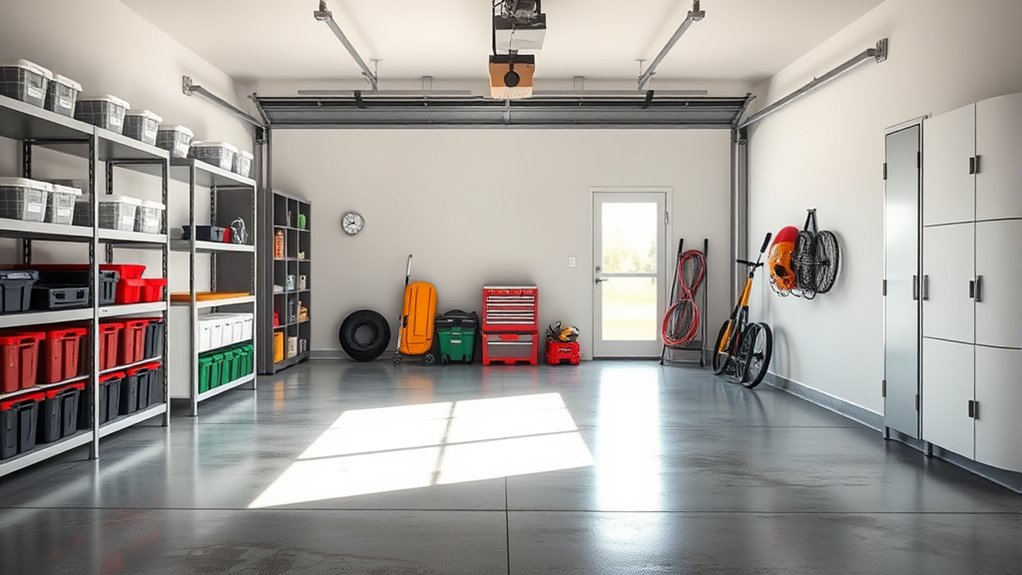There’s a hidden, strong demand for secure garage storage in many communities, offering you a chance to earn extra income. By organizing your garage efficiently, adding security measures, and setting clear access rules, you can attract tenants seeking safe, accessible space. Ensuring proper insurance and legal protections will protect your interests too. To discover how to maximize your income and manage the space effectively, keep exploring this opportunity further.
Key Takeaways
- Hidden demand exists for secure, well-organized garage storage among nearby residents and small business owners.
- Proper organization and security measures significantly boost your garage’s attractiveness to renters.
- Clear legal agreements and insurance coverage protect you from potential damages or theft liabilities.
- Implementing access controls and regular maintenance ensures safety and enhances renter trust.
- Promoting the garage’s security features and cleanliness can maximize rental income and occupancy rates.

Have you contemplated turning your unused garage space into a source of extra income? Many homeowners overlook the potential of their garages beyond just parking their cars. By renting out your garage for storage, you can tap into a surprisingly high demand without much hassle. But before jumping in, it’s vital to focus on garage organization. A well-organized space not only maximizes storage capacity but also makes your garage more attractive and accessible to renters. Clear out clutter, install sturdy shelving, and create designated zones for different types of items. When your garage is tidy and functional, it becomes a desirable storage solution, encouraging more people to rent it.
Transform your garage into a tidy, accessible storage space to attract more renters and maximize income potential.
Alongside garage organization, implementing proper security measures is essential. You want to protect your property and make sure your renters feel safe leaving their belongings in your space. Start with secure locks on garage doors and consider installing a security system with cameras. Visible surveillance acts as a deterrent for theft and vandalism, giving both you and your renters peace of mind. Additionally, consider lighting options that keep the area well-lit at night, reducing the risk of break-ins. If you’re renting out to multiple tenants or long-term renters, establish clear rules and boundaries to prevent conflicts and make certain everyone respects the space.
You should also think about insurance. Check with your provider to see if your current policy covers damages or theft related to renting out your garage. If not, consider obtaining additional coverage to mitigate potential risks. Setting up a rental agreement that clearly states responsibilities, payment terms, and rules for the use of your garage helps protect you legally and financially. Including clauses about security measures, maintenance, and prohibited items ensures everyone’s expectations are aligned.
Another aspect to think about is access control. Decide whether you’ll allow renters to come and go freely or by appointment only. Using lockboxes or secure entry codes can help regulate access and prevent unauthorized use. Regularly inspecting your garage, especially if you’re renting it out long-term, is a smart move to catch any issues early. Keep in mind that communication is key—keeping a good rapport with your renters and addressing concerns promptly will foster trust and encourage longer-term agreements. Incorporating automation in business technology, such as digital access controls, can further streamline management and improve security.
Frequently Asked Questions
What Are the Legal Considerations for Renting Garage Space?
When you rent out garage space, you need to take into account legal factors like parking regulations and local ordinances. Make sure your property allows such rentals and check if any permits are required. You should also clarify liability issues and draft a clear agreement to protect yourself. Staying compliant with zoning laws and adhering to HOA rules prevents potential legal issues, ensuring your rental process runs smoothly and legally.
How Do I Set Appropriate Rental Prices for My Garage?
Setting the perfect rental price might feel like finding a needle in a haystack, but don’t worry—your success depends on smart pricing strategies. Start with thorough market research to see what others charge for similar space. Consider factors like location, size, and amenities. Price competitively, but leave a little wiggle room for negotiations. Regularly review and adjust your rates to stay ahead in this booming demand!
What Insurance Coverage Is Necessary for Storage Renters?
When considering insurance coverage for storage renters, you need to think about garage insurance and renter coverage. You should require your renters to have their own renter insurance to protect their belongings. Additionally, make certain your garage insurance policy covers potential damages or liability risks related to storage. This way, both you and your renters stay protected from unexpected incidents, making the rental arrangement safer and more secure for everyone involved.
How Can I Verify the Trustworthiness of Potential Tenants?
To verify the trustworthiness of potential tenants, you should conduct thorough tenant screening, including background and credit checks. Always use detailed lease agreements that clearly outline expectations and responsibilities, which help protect you legally. Ask for references from previous landlords and verify their employment status. Rely on your instincts and look for consistency in their responses. This approach ensures you select reliable tenants and minimizes risks.
Are There Tax Implications When Renting Out Garage Storage?
When renting out garage storage, you should consider tax implications, as rental income is usually taxable. Verify your garage security is tight to protect your property and tenants’ belongings. Draft clear rental agreements to specify terms and avoid misunderstandings. Keep detailed records of all income and expenses related to the rental. Consulting a tax professional can help you understand deductions and reporting requirements, making this process smoother.
Conclusion
By opening up your garage for storage, you’re gently tapping into a quiet, overlooked stream of opportunity. It’s like sharing a cozy corner of your home’s story, quietly helping others while making a little extra. Embrace the chance to turn your unused space into a subtle, steady source of support—where your generosity is a soft whisper, and the benefits quietly bloom beneath the surface. Sometimes, the smallest openness can lead to the sweetest rewards.









